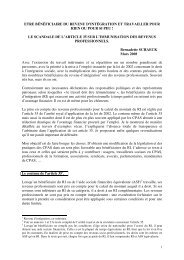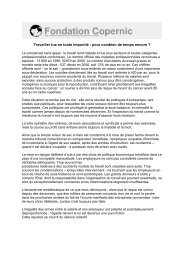Awra Amba RJ 300612 EN - Contacter un comité local d'Attac
Awra Amba RJ 300612 EN - Contacter un comité local d'Attac
Awra Amba RJ 300612 EN - Contacter un comité local d'Attac
You also want an ePaper? Increase the reach of your titles
YUMPU automatically turns print PDFs into web optimized ePapers that Google loves.
<strong>Awra</strong> <strong>Amba</strong>, a current experiment of utopian socialism<br />
Atnafu (2005/57-‐58) Yassin (2008/83) Mekonnen (2009/5) Synthesis <br />
Intellectual honesty <br />
(/ lying) <br />
Loyalty to his people <br />
Purity of thought, words and deeds <br />
Brotherhood <br />
Solidarity <br />
Courage <br />
Honesty <br />
(/ theft, lying) <br />
Human rights <br />
Peace <br />
Solidarity <br />
Non dependence <br />
(/addiction) <br />
Reason <br />
(/ emotions not base on <br />
reasons) <br />
Rigorist <br />
(/ civil and religious <br />
festivities) <br />
Gender equality <br />
Dignity <br />
Individual rights <br />
Tolerance <br />
Honesty <br />
Human rights <br />
Solidarity <br />
Rationalism <br />
Table 2:<br />
Essential values of <strong>Awra</strong> <strong>Amba</strong> as defined by three authors, categorized in four groups,<br />
with antonyms between brackets.<br />
- Why are people envying each other, disliking each other on the pretext of religion or other<br />
differences, while the essence of all religions is the value of humanity?<br />
- Why attach so much importance to the world after the death nobody can’t be sure, at the<br />
expense of the practical world, whose fate could <strong>un</strong>doubtedly be shaped by the cumulative<br />
effort of human beings?<br />
- Why are people fighting to have a comfortable world after the death? Can’t we create a<br />
heaven in this world?<br />
- Why to build mosques and churches, which are the field of God, while God is everywhere, in<br />
heart, soul, eyes, etc?<br />
- Why are old people not given due regard regardless of their considerable contribution to the<br />
society?<br />
- Why is the culture of the society rigid and conservative without allowing individuals and<br />
especially children to think freely and to go in their own to the extent that it is reasonable?<br />
- Why do religions define days to work and days on which people of that particular religion<br />
should not work? Why do the latter eat in these days? Do people suffering from poverty and<br />
h<strong>un</strong>ger should take rest and abandon fields and other activities?<br />
This author proposes finally a new list of the f<strong>un</strong>damental values of <strong>Awra</strong> <strong>Amba</strong>: peace, love and<br />
respect between human beings (men, women, children and aged) (Ya08/130).<br />
These values are either explicit – claimed by the comm<strong>un</strong>ity, or implicit – not claimed as such but<br />
we can deduce from the analysis of the behaviours. We describe in detail in the following paragraphs<br />
what we define as the main values, from Table 2, from explicit values presented solely in the<br />
literature on <strong>Awra</strong> <strong>Amba</strong>, and from values implicit to behaviours. They are finally honesty, equality,<br />
solidarity and rationalism.<br />
The explicit rules are written in a document in Amharic of about twenty pages, the Comm<strong>un</strong>al<br />
Statute, a version of which was signed in 2007 (Me09/40). Even if Zumra is without doubt their<br />
inspirer, they were chosen by the comm<strong>un</strong>ity: Zumra believes that the decisions cannot and must not<br />
be imposed by a person or a structure, but discussed in depth and taken by those who are concerned,<br />
34 / 85

















